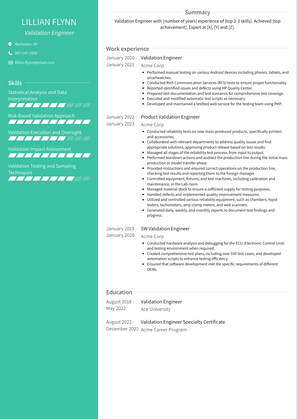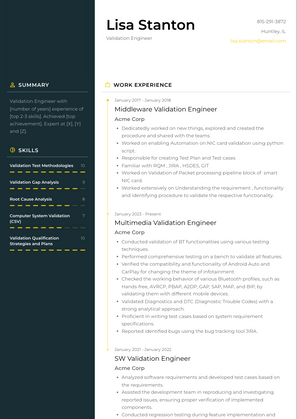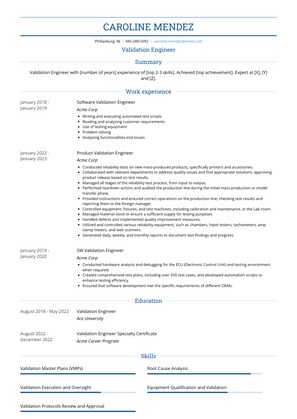3+ Validation Engineer Resume Examples and Templates
This page provides you with Validation Engineer resume samples to use to create your own resume with our easy-to-use resume builder. Below you'll find our how-to section that will guide you through each section of a Validation Engineer resume.



What Do Hiring Managers Look for in a Validation Engineer Resume
- Attention to detail for thorough analysis and compliance.
- Analytical thinking to assess complex systems and identify potential issues.
- Technical expertise in relevant technologies, regulations, and standards.
- Problem-solving abilities to address challenges during the validation process.
- Strong communication skills for collaboration and effective reporting.
How to Write a Validation Engineer Resume?
To write a professional Validation Engineer resume, follow these steps:
- Select the right Validation Engineer resume template.
- Write a professional summary at the top explaining your Validation Engineer’s experience and achievements.
- Follow the STAR method while writing your Validation Engineer resume’s work experience. Show what you were responsible for and what you achieved as a Validation Engineer.
- List your top Validation Engineer skills in a separate skills section.
How to Write Your Validation Engineer Resume Header?
Write the perfect Validation Engineer resume header by:
- Adding your full name at the top of the header.
- Add a photo to your resume if you are applying for jobs outside of the US. For applying to jobs within the US, avoid adding photo to your resume header.
- Add your current Validation Engineer to the header to show relevance.
- Add your current city, your phone number and a professional email address.
- Finally, add a link to your portfolio to the Validation Engineer resume header. If there’s no portfolio link to add, consider adding a link to your LinkedIn profile instead.
Bad Validation Engineer Resume Example - Header Section
Rayna 35 Marshall Drive Chardon, OH 44024 Marital Status: Married, email: cooldude2022@gmail.com
Good Validation Engineer Resume Example - Header Section
Rayna Walton, Chardon, OH, Phone number: +1-555-555-5555, Link: linkedin/in/johndoe
Make sure to add a professional looking email address while writing your resume header. Let’s assume your name is John Doe - here is a formula you can use to create email addresses:
- firstnamelastname@email.com - johndoe@email.com
- firstname.lastname@email.com - john.doe@email.com
- lastname.firstname@email.com - doe.john@email.com
- f.lastname@email.com - j.doe@email.com
- l.firstname@email.com - d.john@email.com
- firstnamelastname12@email.com - johndoe12@email.com
For a Validation Engineer email, we recommend you either go with a custom domain name (john@johndoe.com) or select a very reputed email provider (Gmail or Outlook).
How to Write a Professional Validation Engineer Resume Summary?
Use this template to write the best Validation Engineer resume summary: Validation Engineer with [number of years] experience of [top 2-3 skills]. Achieved [top achievement]. Expert at [X], [Y] and [Z].
How to Write a Validation Engineer Resume Experience Section?
Here’s how you can write a job winning Validation Engineer resume experience section:
- Write your Validation Engineer work experience in a reverse chronological order.
- Use bullets instead of paragraphs to explain your Validation Engineer work experience.
- While describing your work experience focus on highlighting what you did and the impact you made (you can use numbers to describe your success as a Validation Engineer).
- Use action verbs in your bullet points.
Multimedia Validation Engineer Resume Example
Multimedia Validation Engineer
- Conducted validation of BT functionalities using various testing techniques.
- Performed comprehensive testing on a bench to validate all features.
- Verified the compatibility and functionality of Android Auto and CarPlay for changing the theme of infotainment.
- Checked the working behavior of various Bluetooth profiles, such as Hands-free, AVRCP, PBAP, A2DP, GAP, SAP, MAP, and BIP, by validating them with different mobile devices.
- Validated Diagnostics and DTC (Diagnostic Trouble Codes) with a strong analytical approach.
- Proficient in writing test cases based on system requirement specifications.
- Reported identified bugs using the bug tracking tool JIRA.
Product Validation Engineer Resume Example
Product Validation Engineer
- Conducted reliability tests on new mass-produced products, specifically printers and accessories.
- Collaborated with relevant departments to address quality issues and find appropriate solutions, approving product release based on test results.
- Managed all stages of the reliability test process, from input to output.
- Performed teardown actions and audited the production line during the initial mass production or model transfer phase.
- Provided instructions and ensured correct operations on the production line, checking test results and reporting them to the foreign manager.
- Controlled equipment, fixtures, and test machines, including calibration and maintenance, in the Lab room.
- Managed material stock to ensure a sufficient supply for testing purposes.
- Handled defects and implemented quality improvement measures.
- Utilized and controlled various reliability equipment, such as chambers, hipot testers, tachometers, amp clamp meters, and web scanners.
- Generated daily, weekly, and monthly reports to document test findings and progress.
SW Validation Engineer Resume Example
SW Validation Engineer
- Analyzed software requirements and developed test cases based on the requirements.
- Assisted the development team in reproducing and investigating reported issues, ensuring proper verification of implemented components.
- Conducted regression testing during feature implementation and defect fixing processes.
- Reported identified issues with detailed log files to provide comprehensive information for debugging and resolution.
- Participated in software review meetings and provided updates on software status to the customer.
Validation Engineer Resume Example
Validation Engineer
- Performed manual testing on various Android devices including phones, tablets, and smartwatches.
- Conducted Rich Communication Services (RCS) tests to ensure proper functionality.
- Reported identified issues and defects using HP Quality Center.
- Prepared test documentation and test scenarios for comprehensive test coverage.
- Executed and modified automatic test scripts as necessary.
- Developed and maintained a testbed web service for the testing team using PHP.
SW Validation Engineer Resume Example
SW Validation Engineer
- Conducted hardware analysis and debugging for the ECU (Electronic Control Unit) and testing environment when required.
- Created comprehensive test plans, including over 550 test cases, and developed automation scripts to enhance testing efficiency.
- Ensured that software development met the specific requirements of different OEMs.
Software Validation Engineer Resume Example
Software Validation Engineer
- Writing and executing automated test scripts
- Reading and analyzing customer requirements
- Use of testing equipment
- Problem solving
- Analyzing functionalities and issues
Middleware Validation Engineer Resume Example
Middleware Validation Engineer
- Dedicatedly worked on new things, explored and created the procedure and shared with the teams.
- Worked on enabling Automation on NIC card validation using python script.
- Responsible for creating Test Plan and Test cases
- Familiar with RQM , JIRA , HSDES, GIT
- Worked on Validation of Packet processing pipeline block of smart NIC card.
- Worked extensively on Understanding the requirement , functionality and identifying procedure to validate the respective functionality.
Top Validation Engineer Resume Skills for 2023
- Validation Planning and Strategy
- Equipment Qualification and Validation
- Process Validation
- Cleaning Validation
- Computer System Validation (CSV)
- Risk Assessment and Mitigation
- Protocol Development and Execution
- Validation Master Plans (VMPs)
- Installation Qualification (IQ)
- Operational Qualification (OQ)
- Performance Qualification (PQ)
- Validation Documentation and Reports
- Change Control and Impact Assessment
- Validation Testing and Sampling Techniques
- GxP (Good Manufacturing Practices) Compliance
- Regulatory Compliance (FDA, EMA, etc.)
- Data Integrity and Security
- Standard Operating Procedures (SOPs)
- Validation Project Management
- Quality Assurance and Quality Control
- Root Cause Analysis
- Risk-Based Validation Approach
- Validation Test Methodologies
- Validation Equipment Calibration and Maintenance
- Validation Process Optimization
- Statistical Analysis and Data Interpretation
- Validation Protocols Review and Approval
- Validation Gap Analysis
- Validation Non-Conformance Investigation and Resolution
- Validation Training and Education
- Validation Compliance Audits
- Validation Validation Change Control
- Validation Qualification Strategies and Plans
- Validation Execution and Oversight
- Validation Process Automation
- Validation Documentation Management
- Validation Impact Assessment
- Validation Risk Management
- Validation Test Case Development
- Validation Trend Analysis
- Validation Data Integrity Assessment
- Validation Batch Record Review
How Long Should my Validation Engineer Resume be?
Your Validation Engineer resume length should be less than one or two pages maximum. Unless you have more than 25 years of experience, any resume that’s more than two pages would appear to be too long and risk getting rejected.
On an average, for Validation Engineer, we see most resumes have a length of 2. And, that’s why we advise you to keep the resume length appropriate to not get rejected.
How can I highlight my validation engineering experience on a Validation Engineer resume?
To highlight your validation engineering experience, focus on your ability to plan, execute, and document validation activities to ensure systems, processes, and products meet regulatory and quality standards. Include examples of how you’ve validated equipment, processes, or software in compliance with industry standards (e.g., FDA, ISO). Mention your role in developing validation protocols, performing risk assessments, and troubleshooting validation issues.
What are the key skills to feature on a Validation Engineer resume?
Key skills to feature include validation protocol development (IQ, OQ, PQ), equipment and process validation, risk assessment, and knowledge of regulatory standards (e.g., FDA, GMP, ISO). Additionally, highlight your ability to conduct validation testing, perform data analysis, and document results. Emphasize your attention to detail, problem-solving skills, and ability to work within cross-functional teams.
How do I demonstrate my ability to conduct validation activities on my resume?
Demonstrate your ability to conduct validation activities by providing examples of how you’ve developed and executed validation protocols, such as Installation Qualification (IQ), Operational Qualification (OQ), and Performance Qualification (PQ). Mention any experience you have in preparing validation master plans, performing validation testing, and resolving non-conformances. Highlight your role in ensuring compliance with regulatory requirements and maintaining detailed validation documentation.
Should I include metrics on my Validation Engineer resume? If so, what kind?
Yes, including metrics is important to quantify your impact. For example, you could mention the number of validation projects completed, the percentage improvement in system or process reliability, or the reduction in validation-related deviations. Metrics such as increased validation efficiency, successful completion of audits, or reduction in time-to-market due to efficient validation processes provide tangible evidence of your effectiveness as a Validation Engineer.
How can I showcase my experience with regulatory compliance on my resume?
You can showcase your experience by detailing your knowledge of relevant regulations and standards, such as FDA, GMP, or ISO 9001, and how you’ve ensured compliance during validation activities. Mention any experience you have in preparing for regulatory audits, reviewing validation documentation, or working with quality assurance teams. Highlight your ability to ensure that validation processes meet regulatory requirements and are thoroughly documented.
What kind of achievements should I highlight as a Validation Engineer?
Highlight achievements such as successfully validating complex systems, improving validation protocols, or resolving validation issues that led to increased product quality. You could also mention any recognition you received for ensuring compliance during audits, reducing validation-related delays, or implementing more efficient validation processes. Achievements that demonstrate your ability to enhance validation procedures and ensure regulatory compliance are particularly valuable.
How do I address a lack of specific validation experience on a Validation Engineer resume?
If you lack specific validation experience, focus on transferable skills such as quality assurance, process improvement, and experience with regulatory standards. Mention any experience you have in conducting tests, performing equipment qualification, or supporting validation teams in a related capacity. Highlight your understanding of validation principles, your attention to detail, and any relevant coursework or certifications in quality or regulatory compliance.
How important is experience with validation protocols for a Validation Engineer role?
Experience with validation protocols is highly important, as it ensures you can develop, execute, and document validation activities according to industry standards. Highlight your proficiency in creating and executing Installation Qualification (IQ), Operational Qualification (OQ), and Performance Qualification (PQ) protocols. Mention any experience in writing validation reports and addressing deviations or non-conformances identified during validation.
How do I demonstrate my ability to analyze validation data on my resume?
Demonstrate your ability to analyze validation data by describing how you’ve reviewed test results, performed statistical analysis, and identified trends or anomalies during validation. Mention any experience you have in using tools such as Minitab, Excel, or other statistical software to analyze data. Highlight your ability to draw conclusions from validation data and recommend corrective actions or improvements based on your findings.
Should I include certifications on my Validation Engineer resume?
Yes, including certifications can enhance your resume by demonstrating your qualifications and commitment to professional development. Certifications in validation engineering, quality assurance, or regulatory compliance, such as Certified Quality Engineer (CQE) or Six Sigma certifications, can add significant value to your resume. Additionally, training in specific validation standards, such as GMP or ISO, can further strengthen your profile.
-
What Do Hiring Managers Look for in a Validation Engineer Resume
-
How to Write a Professional Validation Engineer Resume Summary?
-
How to Write a Validation Engineer Resume Experience Section?
-
How can I highlight my validation engineering experience on a Validation Engineer resume?
-
What are the key skills to feature on a Validation Engineer resume?
-
How do I demonstrate my ability to conduct validation activities on my resume?
-
Should I include metrics on my Validation Engineer resume? If so, what kind?
-
How can I showcase my experience with regulatory compliance on my resume?
-
What kind of achievements should I highlight as a Validation Engineer?
-
How do I address a lack of specific validation experience on a Validation Engineer resume?
-
How important is experience with validation protocols for a Validation Engineer role?
-
How do I demonstrate my ability to analyze validation data on my resume?
-
Should I include certifications on my Validation Engineer resume?
Copyright ©2025 Workstory Inc.
